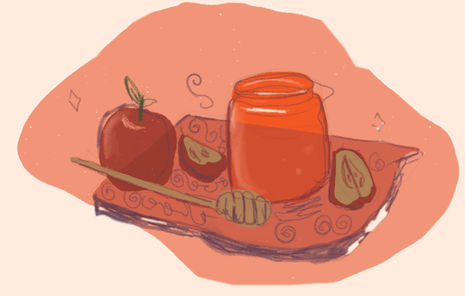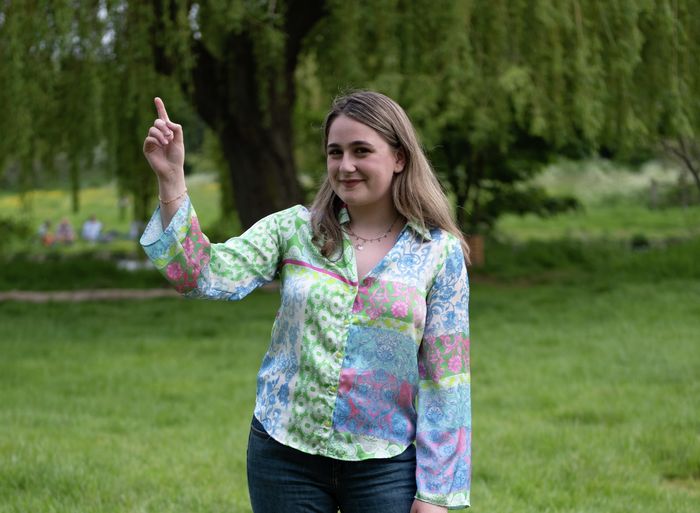Celebrating faith away from home
With the Jewish high holy days often coinciding with her return to Cambridge, Izzy Benardout contemplates her relationship with her faith and finding a space for it away from home.

Growing up Jewish has always rendered the last quarter of the year a busy one. During this period, four of the major festivals – Rosh Hashanah, Yom Kippur, Sukkot, and Chanukah – run in seemingly quick succession, ushering in Autumn and an excuse for a new outfit (a custom to the chagrin of my bank account.) In recent years, in a cosmic alignment of the Gregorian and Hebrew calendars, Chanukah and Christmas have overlapped, allowing for the emergence of awkward portmanteaus (e.g., #chrismukkah) and an amalgamation of the two cultures I have often been sandwiched between. Hearing my grandmother order the kosher turkey, in good time for ‘the day’, as the butcher on the other end of the phone ominously called it, I consider the paradoxes of the current iteration of my faith.
“Every single cell in my body is Jewish – it is written into my DNA and is, simply put, the fabric of my being”
The actor Bradley Cooper has recently come under fire for his portrayal of Leonard Bernstein in a biopic about the Jewish composer. Specifically, Cooper’s use of a prosthetic nose has caused controversy, with some accusing the actor of ‘Jewface’. Besides the explicit garishness of the creative decision, the media scuffle has raised questions about what it means to be Jewish, and how the religion-cum-ethnicity-cum-culture should be understood. The notion that Jewishness lies in the shape of a person’s nose troubles me greatly, harking back to pseudoscientific ideas of racial phenotypes and the haunting Nazi image of the Eternal Jew. Yet, the controversy surrounding the biopic has certainly opened a space to challenge stereotypes surrounding Jews and explore issues of identity.
Every single cell in my body is Jewish – it is written into my DNA and is, simply put, the fabric of my being. Whatever I do (or don’t do), I am Jewish, and I have sought a lot of comfort in this notion. Jewishness has provided me with an anchor on which to tie my identity to. It is the part of me that still googles whether a certain celebrity is Jewish, partakes in complicated webs of Jewish geography, and it is undeniably the root of my fascination with history. Despite my overt secularity, and abandonment of the derech, I still cling on to my faith and tradition – even when I wonder if I am doing enough to still claim the culture that I grew up with.
“Faith is inherently complicated”
Rosh Hashanah (Jewish New Year) and Yom Kippur (the day of Atonement) comprise the holiest days in the Jewish Calendar, and are the days in which I would find myself fostering the most concrete reconnection with my faith despite my agnosticism. Yet, the experience of the pandemic seemed to scupper this. I resisted attending synagogue, and when the high holy days fell over my moving to university, I chose freshers week and making friends over my obligation to celebrate with my family. A level of guilt always emerges when I reflect on these decisions, but I try not to feed it. My Judaism will always be there, and I am so grateful to always have the opportunity to return to it – something that Jews before me have not always had the luxury of.
When I think of festival season, I am invariably brought back to my childhood. Every Sunday, I would attend Sunday School ran by a Chabad family, a movement that emphasises the importance of enfranchising non-observant Jews without judgement, a philosophy that has become fundamental to my relationship with Judaism. While this relationship is not characterised by an adherence to Jewish laws, I attend to my faith through my love of Jewish food (courtesy of my aforementioned grandmother, a stalwart of the Jewish mother stereotype) and by exploring the rich and often tragic tapestry of Jewish history. While I may not fast on Yom Kippur, I hope to use my time in Synagogue to reflect on the year that has just passed and the various mistakes I have made with a view to not repeat them.
Faith is inherently complicated. It often requires you to relinquish control of what you think you know and give some of that responsibility to a higher being. I cannot say I am particularly adept at this, but by observing the High Holy days (albeit in my own way), I feel I am part-way towards honouring my faith, my family, and my former self, who could read Hebrew semi-fluently and attended shul far more regularly. Furthermore, starting a new Hebrew year in a freshly inter-faith household has offered me a chance to evaluate, and in many respects, showcase the elements of my culture I cherish the most (and as Chanukah/Christmas rolls around, I will be vying for double presents).
There is an adage in Jewish circles that goes ‘They tried to kill us, we survived, let’s eat!’. Perhaps a simplification of Jewish customs, I can’t help but subscribe to this notion as I think of the food, I will eat to bring in 5784. One of the symbolic foods of Rosh Hasanah is pomegranate, theorised to have 613 seeds that represent the 613 mitzvot, or good deeds, that Jews should fulfil. While 613 seems ambitious, I like to think that re-connecting with my faith will enrich my life with a little bit more goodness to sustain me for the new year.
 Comment / Anti-trans societies won’t make women safer14 November 2025
Comment / Anti-trans societies won’t make women safer14 November 2025 Comment / Be mindful of non-students in your societies12 November 2025
Comment / Be mindful of non-students in your societies12 November 2025 News / Controversial women’s society receives over £13,000 in donations14 November 2025
News / Controversial women’s society receives over £13,000 in donations14 November 2025 News / Stolen plate returned to Caius after 115 years12 November 2025
News / Stolen plate returned to Caius after 115 years12 November 2025 Theatre / The sultry illusions and shattered selves of A Streetcar Named Desire13 November 2025
Theatre / The sultry illusions and shattered selves of A Streetcar Named Desire13 November 2025










